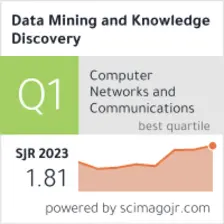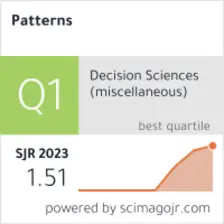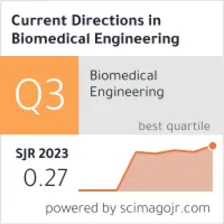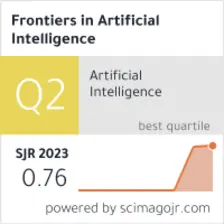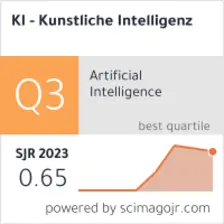Bettina Finzel
Teaching Assistant
M.Sc., Doctoral Candidate
Office: WE5/05.045
Consultation hour: by apppointment
Phone: +49 951 863 2862
Email: bettina.finzel(at)uni-bamberg.de
Bettina Finzel holds a bachelor and a master degree in Applied Computer Science from the University of Bamberg. She is mainly interested in machine learning and cognitive science research, especially for human-centered explaining of AI-based decisions in medicine and education. In 2018 she joined the chair of Cognitive Systems as a research assistant and doctoral candidate in the project Transparent Medical Expert Companion (TraMeExCo), which has been funded by the Federal Ministry for Education and Research from September 2018 until December 2021. From January 2022 until March 2023 she continued her research on explainability for clinical decision-making in the PainFaceReader Project, funded by the German Research Foundation. While finalizing her doctoral thesis, she is currently teaching assistant at the chair of Cognitive Systems for introductory courses on artificial intelligence, machine learning, AI evaluation and neuro-symbolic systems. She is member of the Bamberg Center for Artificial Intelligence, the German Informatics Society, the Federation of German Scientists (VDW), the national Society for Cognitive Science (GK) and of the Bamberg Graduate School of Affective and Cognitive Sciences (BaGrACS). She actively supports various associations outside the university, including ArbeiterKind.de and the network Gendermedizin & ?ffentlichkeit which operate across Germany. As alumni of the make IT mentoring program of the faculty, she offers training and support to current mentors and program coordinators. She is Junior Fellow of the German Informatics Society.
Short portrait of research at the Research in Bavaria webpage. Short interview for I'am a Scientist (Wissenschaft im Dialog).
Profiles on Google Scholar, LinkedIn and researchgate.
I am currently Teaching Assistant for an introductory course in artificial intelligence, machine learning and related seminars and projects.
Curriculum Vitae
- Since 10/2022: Teaching Assistant, Cognitive Systems Chair, Faculty of Information Systems and Applied Computer Sciences, Otto-Friedrich-Universit?t Bamberg, Germany
- 01/2022 - 03/2023: Research Assistant in the project PainFaceReader founded by DFG at Cognitive Systems Group, Faculty of Information Systems and Applied Computer Sciences, Otto-Friedrich-Universit?t Bamberg, Germany
- 10/2018 - 12/2021: Research Assistant in the project Transparent Medical Expert Companion (TraMeExCo) founded by BMBF at Cognitive Systems Group, Faculty of Information Systems and Applied Computer Sciences, Otto-Friedrich-Universit?t Bamberg, Germany
- 10/2016 - 10/2019: Applied Computer Science Study at the Faculty of Information Systems and Applied Computer Sciences, Otto-Friedrich-Universit?t Bamberg, Germany (Master of Science, with honors)
- 04/2018 - 09/2018: Internship concerning the Implementation of Predictive Analytics at MHP Management- und IT-Beratung GmbH
- 10/2012 - 03/2017: Applied Computer Science Study at the Faculty of Information Systems and Applied Computer Sciences, Otto-Friedrich-Universit?t Bamberg, Germany (Bachelor of Science)
Main Research Interests
- Human-centered explainability in medical decision-making, especially interpretable and interactive Machine Learning for human-AI partnerhips
- Explainable Artificial Intelligence for Deep Learning-based classification
- Neuro-Symbolic Artificial Intelligence
- AI Evaluation
Methods
- Inductive Logic Programming
- Convolutional Neural Networks
- Multimodal post-hoc explanations
- Explanatory Dialogues
Further Research Interests
- Mentoring in Computer Science
- Diversity and Fairness
Reviews
Journals
- Transactions on Neural Networks and Learning Systems
- ACM Transactions on Knowledge Discovery from Data
- Cognitive Computation Journal
- Journal of Intelligent Information Systems
- International Journal of Human - Computer Studies
- Information Processing and Management Journal
- ACM SIGMIS Database Journal
Conferences
- iMIMIC at MICCAI 2020, 2021, 2022, 2023, 2024
- IJCAI 2022, 2024
- ICPR 2024
- STRL at IJCAI 2022, 2023
- KI Conference 2019, 2022 (subreviewer), 2023
- XAI4DRL at AAAI 2023
- XIML at ECAI 2023
- ECAI 2023
- Declarative AI 2023
- KR 2023
- KogWis 2022
- XAI4debugging at NeurIPS 2021 (outstanding reviewer team)
- ECML/PKDD Conference 2020, 2021 (subreviewer)
- IET Book Review 2021 (subreviewer)
- ACM SIGMIS Conference 2020 (subreviewer)
- ACM GEWINN Conference 2018
Articles, Papers and Preprints
2025
- Finzel B. (2025). Current methods in explainable artificial intelligence and future prospects for integrative physiology. Pflügers Archiv - European Journal of Physiology. Cham: Springer Nature Switzerland. -- [Article] [Q1-ranking]
2024
- Finzel B., Knoblach J., Thaler Anna M., Schmid U. (2024). Near Hit and Near Miss Example Explanations for Model Revision in Binary Image Classification. In: Julian, V., et al. Intelligent Data Engineering and Automated Learning – IDEAL 2024. IDEAL 2024. Lecture Notes in Computer Science, vol 15347. Cham: Springer Nature Switzerland. -- [Paper]
- Finzel B. (2024). Human-centered Explanations: Lessons Learned from Image Classification for Medical and Clinical Decision Making. Künstliche Intelligenz. -- [Article] [Q3-ranking]
- Finzel B. (2024). Inductive Programming for Explainable Artificial Intelligence (IP for XAI). Approaches and Applications of Inductive Programming, 192, Dagstuhl Reports 13(2), Dagstuhl Seminar 23442, 2024. -- [Report]
- Finzel B., Patrick Hilme, Johannes Rabold, Ute Schmid (2024). When a Relation Tells More Than a Concept: Exploring and Evaluating Classifier Decisions with CoReX. 2024. -- [Preprint]
2023
- Schwalbe G., Finzel B. (2023). A Comprehensive Taxonomy for Explainable Artificial Intelligence: A Systematic Survey of Surveys on Methods and Concepts. Data Mining and Knowledge Discovery 38(5), 3043-3101, 2023. -- [Article] [Q1-ranking]
- Finzel, B., Rieger, I., Kuhn, S., & Schmid, U. (2023). Domain-Specific Evaluation of Visual Explanations for Application-Grounded Facial Expression Recognition. In International Cross-Domain Conference for Machine Learning and Knowledge Extraction (pp. 31-44). Cham: Springer Nature Switzerland. -- [Paper]
- Holzinger, A., Saranti, A., Angerschmid, A., Finzel, B., Schmid, U., & Mueller, H. (2023). Toward human-level concept learning: Pattern benchmarking for AI algorithms. Patterns. -- [Article] [Q1-ranking]
2022
- Finzel B., Saranti A., Angerschmid A., Tafler D., Pfeifer S., Holzinger A. (2022). Generating Explanations for Conceptual Validation of Graph Neural Networks - An Investigation of Symbolic Predicates Learned on Relevance-Ranked Sub-Graphs. Künstliche Intelligenz, 2022. -- [Article] [Q2-ranking]
- Finzel B., Kuhn S., Tafler D., Schmid U. (2022). Explaining with Attribute-based and Relational Near Misses: An Interpretable Approach to Distinguishing Facial Expressions of Pain and Disgust. 11th International Workshop on Approaches and Applications of Inductive Programming (ILP, 2022, Cumberland Lodge, Great Windsor Park, UK) -- [Paper, Preprint]
- Rieger I., Pahl J., Finzel B., Schmid U. (2022). Regularization by Integrating Co-Occurrence Domain Knowledge for Affect Recognition. Workshop on Robust AI for High-Stakes Applications (RAI @ KI, 2022, virtual at Trier, Germany). -- [Extended Abstract]
- Finzel B., Schmid U. (2022). Context-Aware XAI Methods for Joint Human-AI Problem Solving. Biannual Conference of the German Cognitive Science Society, (KogWis, 2022, Freiburg, Germany). -- [Abstract]
- Mohammed A., Geppert C., Hartmann A., Kuritcyn P., Bruns V., Schmid U., Wittenberg T., Benz M., Finzel B. (2022). Explaining and Evaluating Deep Tissue Classification by Visualizing Activations of Most Relevant Intermediate Layers. Current Directions in Biomedical Engineering 8(2), 2022. -- [Article] [Q4-ranking]
- Rieger I., Pahl J., Finzel B., Schmid U. (2022). CorrLoss: Integrating Co-Occurrence Domain Knowledge for Affect Recognition. International Conference on Pattern Recognition, (ICPR, 2022, Montreal, Canada). -- [Paper, Preprint]
2021
- Finzel B., Tafler D., Thaler A., Schmid U. (2021). Multimodal Explanations for User-centric Medical Decision Support Systems. Association for the Advancement of Artificial Intelligence Fall 2021 Symposium in HUman partnership with Medical Artificial iNtelligence (AAAI-HUMAN.AI, virtual event, 4.-6.11.2021). -- [Paper]
- Finzel B., Kollmann R., Rieger I., Pahl J., Schmid U. (2021). Deriving Temporal Prototypes from Saliency Map Clusters for the Analysis of Deep-Learning-based Facial Action Unit Classification. FG Knowledge Discovery und Machine Learning. LWDA 2021 at MCML, (LWDA, 01.09–03.09.2021., Munich, Germany). -- [Paper]
- Finzel B., Tafler D., Scheele S., Schmid U. (2021). Explanation as a Process: User-centric Construction of Multi-level and Multi-modal Explanations. 44th German Conference on Artificial Intelligence, (KI, 27.9.-1.10.2021, Berlin, Germany). -- [Paper, Preprint] - Best Paper nomination
2020
- Bruckert S., Finzel B., Schmid U. (2020). The next generation of medical decision support: a roadmap towards transparent expert companions. Frontiers in Artificial Intelligence, 3, p. 75 -- [Article] [Q2-ranking (from 2022)]
- Finzel B. (2020), Korrigierbares maschinelles Lernen mithilfe wechselseitiger Erkl?rungen am Beispiel der Medizin. Vol. 44, Medizininformatik. Gesellschaft für Informatik e.V.. (S. 14-17). -- [Article]
- Deuschel J., Finzel B., Rieger I. (2020), Uncovering the Bias in Facial Expressions. Kolloquium FORSCHEnde FRAUEN 2020 - - Gender in Gesellschaft 4.0, Beitr?ge Bamberger Nachwuchswissenschaftlerinnen, Band 12, S. 15-42, Bamberg University Press. -- [Article, Preprint]
- Rieger I., Kollmann R., Finzel B., Seu? D., Schmid U. (2020), Verifying Deep Learning-based Decisions for Facial Expression Recognition. 28th European Symposium on Artificial Neural Networks, Computational Intelligence and Machine Learning (ESANN, 22-24.4.2020, Bruges, Belgium). -- [Paper]
- Schmid U., Finzel B. (2020), Mutual Explanations for Cooperative Decision Making in Medicine. Künstliche Intelligenz, 34(2), 227–233. -- [Article][Q3-ranking]
2019
- Rieger I., Finzel B., Seu? D., Wittenberg T., Schmid U. (2019) Make Pain Estimation Transparent: A Roadmap to Fuse Bayesian Deep Learning and Inductive Logic Programming (Poster). 41st Annual International Conference of the IEEE Engineering in Medicine & Biology Society (EMBC, 23.-27. Juli 2019, Berlin). -- [Extended Abstract]
- Finzel B., Schmid U. (2019) Erkl?rbare KI für medizinische Anwendungen. 49. Kongress der Deutschen Gesellschaft für Endoskopie und Bildgebende Verfahren e.V. (28.-30. M?rz 2019, Stuttgart), Track der Deutschen Gesellschaft für Biomedizinische Technik "Krankenhaus der Zukunft". -- Talk
- Finzel B., Rabold J., Schmid U. (2019) Explaining Relational Concepts: When Visualisation and Visual Interpretation of a Deep Neural Network's Decision are not enough. Europ?ische Konferenz zur Datenanalyse (ECDA, 18.-20. M?rz 2019, Bayreuth), Special Session on Interpretable Machine Learning. -- [Abstract, Event]
- Finzel, B., Sperker H.-C. (2019) Machine Learning goes E-Mobility: Mit Datenanalyse die Elektromobilit?t vorantreiben - Konzepte und Methoden zur Implementierung von Predictive-Analytics-Komponenten. JAXenter Online Magazin, 2019. -- [Article]
2018
- Finzel B., Deininger H., Schmid U. (2018) From beliefs to intention: mentoring as an approach to motivate female high school students to enrol in computer science studies. In Proceedings of the 4th Conference on Gender & IT (GenderIT '18). ACM, New York, NY, USA, 251-260.
2017
- Elmamooz, G., Finzel, B. & Nicklas, D., (2017). Towards Understanding Mobility in Museums. In: Mitschang, B., Nicklas, D., Leymann, F., Sch?ning, H., Herschel, M., Teubner, J., H?rder, T., Kopp, O. & Wieland, M. (Hrsg.), Datenbanksysteme für Business, Technologie und Web (BTW 2017) - Workshopband. Bonn: Gesellschaft für Informatik e.V.. (S. 127-136).
Master's Thesis
- Finzel B., (2019). Explanation-guided Constraint Generation for an Inverse Entailment Algorithm. Master's Thesis, University of Bamberg, 2019 (unpublished).
Bachelor's Thesis
- Finzel B., (2017). A graph-based context model for PoI-based interactive guidance in museums. Bachelor's Thesis, University of Bamberg, 2017 (unpublished).
Journals I contributed to:
Teaching
Interested students may contact me directly via email to request for supervision of a project or thesis topic.
Lectures/Practices
Summer Term 2024
"Introduction to Artificial Intelligence" (for bachelor students)
Winter Term 2023/24
- "Introduction to Machine Learning" (for bachelor students)
Summer Term 2023
"Introduction to Artificial Intelligence" (for bachelor students)
Advised Student Projects
Winter Term 2024/25
- 6 ECTSProject: AI Evaluation (bachelor and master students), requires registration via VC course
Winter Term 2023/24
- 6 ECTS Project: Evaluating AI Systems and ML Models (bachelor and master students)
Winter Term 2022/23
- 15 ECTS Project (Aleksej Kucerenko): Concept- and Relation-based Explanations for Image Classification with CNNs - A Demonstrator (BA AI)
Summer Term 2022
- 15 ECTS Project (David Tafler): Classifying Relational Visual Concepts in Images with a Neuro-Symbolic Approach (MA CitH)
Summer Term 2021
- 15 ECTS Project (Simon Kuhn): Automatic Verification of Convolutional Neural Networks: A Landmark-based Approach for Facial Action Unit Classification (MA AI)
Advised Student Seminars
- Seminar Summer Term 2024: "Neuro-Symbolic AI" (KogSys-Sem-B/M2)
- Seminar Summer Term 2023: "Neuro-Symbolic AI" (KogSys-Sem-B/M2)
- Seminar Winter Term 2022/23: "KI@BA: Künstliche Intelligenz in Bamberg" (KogSys-Sem-B)
- Interdisciplinary seminar (applied computer science, communication science, psychology)
Advised Student Theses
In progress:
18. Jonas Schmidt: Comparing Different Fine-Tuning Strategies in Vision Transformer Training for Robust Classification of Facial Expressions (BA WI)
17. Philippe Crackau: Examining Image Classifier Decisions Through the Lense of Probabilistic Relational Explanations – Extending the CoReX Framework by Probabilistic Logic Programming (MA CitH)
Finished:
16. Maren Stümke: Identifying and Overcoming Student’s Misconceptions in Chemistry: An Intelligent Tutoring System to Teach Chemical Equations with Worked-out Analogical Examples (MA CitH, finished in June 2024)
15. Luisa Schneider: The Effects of Similarity in Example Images on Generating Interpretable Pertinent Negatives with CEM (BA AI, finished in December 2023)
14. Shamim Miroliaei: Exploring Potential Biases in Sequential Data Classification for Hand Gesture Recognition using Layer-wise Relevance Propagation and Cluster Analysis (MA SoSySc, finished in December 2023)
13. Bianca Zimmer: Explaining Decision Boundaries of CNNs Through Prototypes, Near Hits and Near Misses - A Comparison on Multiclass Medical Image Data Utilizing LRP Heatmaps (MA Survey Statistics, finished in February 2023)
12. Patrick Hilme: Verbally Explaining Image Classifications from Relevant Visual Features: Towards Learning Symbolic Structures Using Layer-wise Relevance Propagation and Logic Programming (MA AI, finished in December 2022)
11. Deepika Arneja: Landmark-based Classification of Facial Expressions with a Spatio-Temporal Attention Graph Neural Network (MA SoSySc, finished in September 2022)
10. Simon Kuhn: Strategies for Privacy-preserving Classification of Facial Expressions (MA AI, finished in July 2022)
9. Nina Krob: Eine Multimodale Interaktive Schnittstelle zur Erkl?rung der Klassifikation Hierarchischer und Mehrwertiger Konzepte Basierend auf Logischer Programmierung (A Multimodal Interactive Interface to Explain the Classification of Hierarchical and Multiarity Concepts Based on Logic Programming) -- (MA AI, finished in March 2022)
8. Sonja Ruschhaupt: Explaining Image Classifications with Near Misses and Prototypes -- An Application to Facial Expression Analysis (BA AI, finished in November 2021)
7. Antonia H?fer: Enhancing the Interactive Machine Learning Companion LearnWithME with Global Constraints for Explanation-based Model Correction (BA AI, finished in October 2021)
6. Namrata Jain: Managing Chemical Production Processes with Deep (Transfer) Learning (MA ISSS, in collaboration with Wacker AG, finished in February 2021)
5. Rene Kollmann: Explaining Facial Expressions with Temporal Prototypes (MA AI, finished in December 2020)
4. Michael Fuchs:Towards Fast Interactive Machine Learning with Aleph (BA AI, finished in November 2020)
3. Isabel Saffer: Generierung und Evaluation von kontrastiven Erkl?rungen für die Paarweise Klassifikation von Partiell Geordneten Tumorklassen in der Histopathologie (Generating and Evaluating Contrastive Explanations for Pairwise Classification of Partially Ordered Tumorclasses in Histopathology) -- (BA AI, finished in August 2020)
2. Nina Krob: Ausdrucksst?rke und Effizienz in der Generierung von Erkl?rungen: Vergleich von Association Rule Mining und Induktiver Logischer Programmierung für Interpretierbare Klassifikation von Schmerz (Expressiveness and Efficiency in Explanation Generation: Comparing Association Rule Mining and Inductive Logic Programming for Interpretable Pain Classification) (BA AI, finished in July 2020)
1. Simon Kuhn: Identifying Near Misses for Relational Concepts with Graph Matching – Explaining Classifier Decisions of Facial Expressions (BA AI, finished in June 2019)
Keynotes and Plenary Talks
2024
- Artificial Intelligence in Medical Research and Practice, 68th Annual Meeting of the Society of Thrombosis and Haemostasis Research, Vienna, 27.2.2024. -- [Event]
Scientific Outreach Talks
2025
- Vertrauenswürdige Künstliche Intelligenz in der Medizin: Von einfachen Annotationen zu menschlichen Erkl?rungen, Vortragsreihe ?BIG Lectures“ des Büros für Innovation und Gründung und Digital Health Bamberg, Lagarde1, Bamberg, 28.1.2025 – [Website of BIG]
2024
- Generating Concept-based and Relational Explanations for Image Classification,RuleML Webinar (online talk), 31.1.2024. – [Repository]
2023
- Evaluating Concept- and Relation-based Explanations for Image Classification, Measuring Understanding Conference, Paderborn, Nov. 2023. -- [Event]
- Concept- and Relation-based Explanations for Image Classification with CNNs, University of Paderborn at Transregio 318 "Constructing Explainability", 13.9.2023
- GOSTNERS SUPPKULTUR #14: TED TALKS & TANGO, Gostner Hoftheater, Nürnberg, 8.7.2023 -- [Event]
- Interpretable Machine Learning: A Bi-directional Approach with Inductive Logic Programming, TU Munich at group of Prof. Dr. Senthold Aseng, 13.4.2023.-- [Website of Institute]
- Wann und wie treffen Mensch und KI im Histo Labor zusammen?, Bamberger Morphologietage, 29.1.2023.
2022
- Erkl?rbare Künstliche Intelligenz in der medizinischen Bildgebung ein technischer Ansatz, VDE Symposium: Künstliche Intelligenz (KI) in Medizinprodukten, 6.12.2022. -- [Event]
- Erkl?rbare Künstliche Intelligenz in der Medizin am Beispiel der bildbasierten medizinischen Diagnostik, Clusterkonferenz TAO, TAO Themenjahr "Gesundheit", 29.11.2022.
- Was ist Künstliche Intelligenz?, Bildungssalon der Bundeszentrale für politische Bildung (bpb ), online, 29.11.2022.
- PainFaceReader: Explainable Interactive Machine Learning for Pain Assessment, BamLID Ideenworkshop, 11.11.2022. -- [Event]
- Erkl?rbare Künstliche Intelligenz in der Medizin: Multimodale und dialogbasierte Erkl?rungen am Beispiel der bildbasierten medizinischen Diagnostik, Talk Series “Philosophy of Technology”, Emmy Noether Research Group on The Phenomenon of Interaction in Human-Machine Interaction, FernUniversit?t Hagen, 13.7.2022. -- [Program], [Research Group]
- Zielgruppen-orientierte XAI: Multimodale und dialogbasierte Erkl?rungen am Beispiel der bildbasierten medizinischen Diagnostik, VDI/VDE Vernetzungsveranstaltung KI in der Hochschulbildung, together with Prof. Dr. Ute Schmid, 23.6.2022.
- Explainable Machine Learning in Medicine: How can we benefit from Human-AI Partnership in Decision-Making?, 1st Taulí Health Artificial Intelligence Symposium (THAIS), Hospital de Sabadell, Barcelona, 20-21.6.2022. -- [Event], [Program]
2021
- Künstliche Intelligenz - Konkurrenz oder Partnerschaft, Frauennetzwerk Fürth (virtual event), 08.06.2021. -- [Event]
- Towards a hybrid explanation framework, Fraunhofer ITEM at group of Prof. Dr. Lena Wiese, 02.06.2021. -- [Website of Institute]
- A hybrid explanation framework for decision-making in medicine, ADA Day Fraunhofer IIS, 25.05.2021. -- [Website of Institute]
2020
- Uncovering the Bias in Facial Expressions, FORSCHEnde FRAUEN Kolloquium der Universit?t Bamberg, 23.-30.6.2020 -- [Program], [News], [Article], [Video]
- Constraints as Verbal Corrective Feedback -- An Inductive Logic Programming Approach to Generate and Adapt Explanations in Image Classification, Virtuelle Konferenz der GI Fachgruppe Frauen und Informatik, 25.4.2020 -- [Program]
- Constraints as Verbal Corrective Feedback -- An Inductive Logic Programming Approach to Generate and Adapt Explanations in Image Classification, 1st GK Doctoral Symposium on Cognitive Science, 23.-24.1.2020 -- [Abstract]
2019
- Skalpell bitte! KI in der Medizin: Chancen und Herausforderungen, KI und Wir* Convention, Magdeburg, 23.11.2019 -- [Program], [Abstract], [News]
- Learning Expressive First Order Rules - Introduction to Inductive Logic Programming, talk held in KIZI seminar, University of Economics Prague, 22.10.2019 -- [Event]
- Künstliche Intelligenz und Medizin: Von operierenden Robotern und Computerdiagnosen, Tag der Begabtenf?rderung 2019, Kloster Banz, 8.7.2019 -- [Report]
- Gedanken zu Künstlicher Intelligenz und der künftigen Gesellschaft, Diskussionspanel Gesellschaft 4.0, Jahreskonferenz des Deutsch-Tschechischen Gespr?chsforums zum Thema "Die Zukunft der deutsch-tschechischen Beziehungen aus der Sicht junger Deutscher und Tschechen", Olomouc, 20.11.2018 -- [Program]
Lectures, Workshops and Courses
- Lectures
- Von wissensbasierter KI zu ChatGPT: Eine Einführung in die Künstliche Intelligenz, Ringvorlesung Data Literacy, Karlsruher Institut für Technologie (KIT), Forum Wissenschaft und Gesellschaft (FORUM), Karlsruhe, 13.11.2024. -- [Program and Abstract in German]
- Introduction to Explainable Artificial Intelligence for Medicine: Methods and Applications, EUKISS – European Kidney Summer School, Regensburg, 9.7.2023. -- [Event]
- Two lectures on Interactive Machine Learning and Explaining Deep-learning classifier with LIME for the online learning course Explainable Machine Learning for Engineering, AI-Campus, funded by the German Federal Ministry of Education and Research (BMBF) -- [Website of the platform]
- Learning from Mutual Explanations for Cooperative Decision Making in Medicine - Prof. Dr. Ute Schmid and Bettina Finzel at the AI4Health Lecture Series, University of Luxembourg, 04.11.2020 -- [Abstract]
- Classifying Medical Data with Neural Nets and Inductive Logic Programming, lecture including practical tasks in R and Prolog, University of Economics Prague, 22.10.2019 -- [Event]
- Workshops and Complete Courses
- Introduction to Explainable Artificial Intelligence (XAI), 9th International Week (I-Week), University of Economics Prague, 20.1-23.1.2025 – [Event]
- Künstliche Intelligenz (KI) im Histolabor, Bamberger Morphologietage 2024, BMT Kompaktkurs, 13.1.2024. -- [Event]
- Baue dir einen Chatbot mit Python!, Online Workshop zusammen mit ArbeiterKind e.V., Nov. 2023. -- [Website of the Association]
- K?nnen wir KI Systeme entwickeln, die gendersensibel klassifizieren?, Workshop des Netzwerks Gendermedizin & ?ffentlichkeit, Potsdam und virtuell, 31.5.2023. -- [Website of the network]
- Maschinelles Lernen und Data Science – Hands-On mit KNIME, Woche der Forschung, University of Bamberg, 26.2.2019 und 23.10.2020 -- [Program](3.9 MB, 2 Seiten)
- Shiny R - Analysen interaktiv gestalten und visualisieren, course at the TAO-SFZ-Workshop ?KI selber programmieren“, University of Bamberg 29.-31.10.2018 -- [Report]
- Das Mentoring Program make IT, 16. Arbeitstagung der Konferenz der Einrichtungen für Frauen- und Geschlechterstudien im deutschsprachigen Raum (KEG), Arbeitsgruppe ?Mentoringprojekte in der Informatik“, University of Music and Performing Arts, Vienna, 26.9.2018 -- [Program]
Participation in Schools and Seminars
- Invited participant at Dagstuhl Seminar on Approaches and Applications of Inductive Programming 2024, contribution on Inductive Programming for Explainable Artificial Intelligence -- [Report]
- Invited participant at Dagstuhl Seminar on Approaches and Applications of Inductive Programming 2021, joint work with Ute Schmid on Ultra-strong machine learning with explanatory dialogs -- [Report]
- Interdisciplinary College 2021 Günne/M?hnesee Germany (virtual event) “Connected in Cyberspace”, intense four-week spring school, 12.3.-9.4.2021.
- ECML PKDD Summer School 2019 Würzburg Germany “Machine Learning and Data Mining for Geo-Spatial Data/Volunteered Geographic Information, Quality of Experience and Human-Computer Interaction (EPSS19)”, intense one-week spring school, 11.-16.10.2019.
- Interdisciplinary College 2019 Günne/M?hnesee Germany “Out of your senses: from data to insight”, intense one-week spring school, 12.-18.3.2019.
Memberships and Voluntary Services
- Member of the German Society for Cognitive Science (GK)
- Member of the Bamberg Graduate School of Affective and Cognitive Sciences (BaGrACS)
- Member of the German Informatics Society
- Alumni advisor for the make IT Computer Science Mentoring at the University of Bamberg (voluntary)
- Former elected member of the Czech-German Discussion Forum, participation in the task force for social and economic affairs, especially digital transformation topics (voluntary)
Awards
- Junior Fellow of the German Informatics Society 2024 -- [News GI,News ?rzteZeitung,News CogSys]
- Best Poster Award (category: most innovative project) for the PainFaceReader project at the VDW conference 2023 -- [News][Retrospection]
- Finalist of the competition "KI-Newcomer*innen Wettbewerb 2019" of the German Informatics Society, -- [News]
- Finalist of the Future X Healthcare Scientific Excellence Award 2019, Roche, Munich -- [News]
- Female Tech Talents Stipendium (2018) awarded by Campusj?ger
- Award of the Ministry for Environment and Health (2012) for a Sustainability and Nutrition Education Project for Elementary Schools -- [Dreipunktnull Magazin][Press release]



